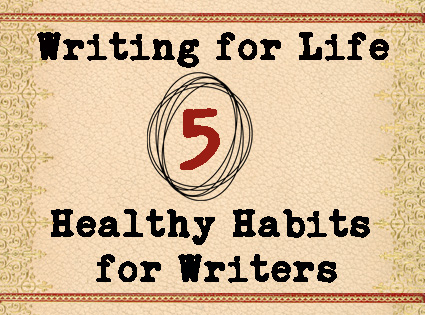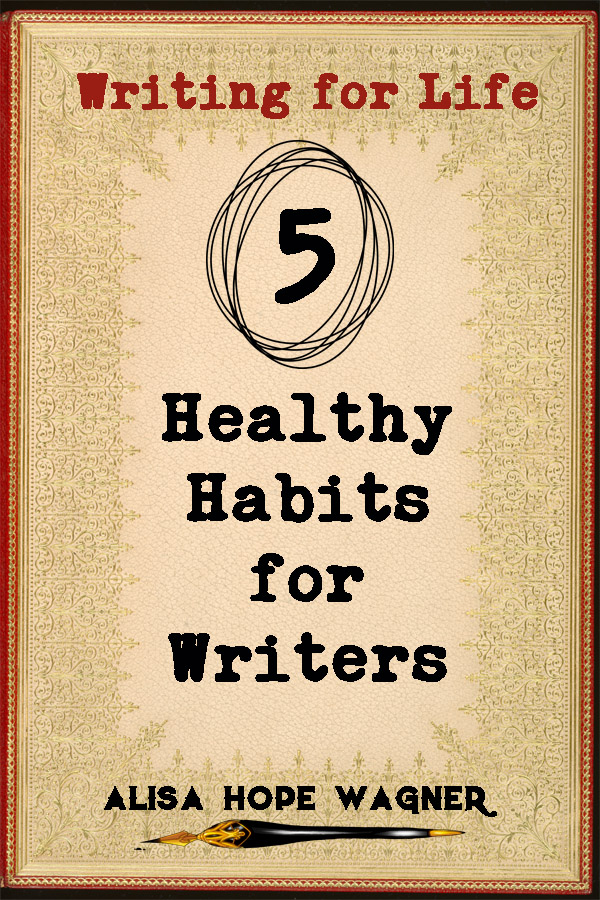
5 Healthy Habits of Writers: Writing for Life
Writers and bloggers can sit isolated in front of a computer screen for hours at a time. Like any career or pastime, writing has its benefits and pitfalls. Writing allows us to communicate information in a format that is easily transferable. Once we click “Send,” our words can be spread across the stratosphere.
However, if we do not incorporate healthy habits into our writing lifestyle, the act of writing itself can begin to wear us down. Just like a park ranger, a race car driver and/or teacher, writing is a career that comes with a list of cautions. I have been writing and blogging prolifically for over a decade. At 18 books and counting, here are the 5 healthy habits I have learned that every writer and blogger should know.
First Healthy Habit: Posture and Work Station
Did you know that writing can cause injury? Posture is extremely important to a healthy writing lifestyle. It may take practice, but being aware of your posture will help your writing time last longer without damaging your body with repetitive movements of typing and using your mouse.
- Keep your back straight, shoulders back and chest proud. Your feet should be planted directly in front of you.
- Your arms should be in the form of an “L” with your keyboard on the pull-out drawer of your desk or on a lap desk.
- The keyboard should never be high up on the desk because your shoulders will have to rise up to compensate. This will cause shoulder and upper back strain.
- Your head should always be looking straight ahead, never down. This can cause neck pain. If you are using a laptop instead of desk top, purchase a laptop stand.
- Your head should be about an arm’s length from your monitor. Reach out your arm and touch the screen to make sure you are at the right distance.
- Purchase an ergonomic keyboard. These will take time to get used to, but they allow your hands and fingers to maintain a natural posture while typing.
- Make sure your mouse feels comfortable in your hand. Find an ergonomic mouse that allows you to rest your hand while making edits. Just like shoes, a mouse may feel comfortable at first, but after using it all day, incorrect fitting can aggravate the tissue and nerves of your hand, arm and shoulder.
- Also, if you use a mousepad, make sure the click setting is on “tap to click.” This will prevent the dreaded “Mouse Shoulder” that happens from repetitive hard clicks and incorrect hand posture. Mouse shoulder causes radiating pain from your fingers, up your arm and to your rhomboid muscles between your shoulder blades.
- Finally, if you are using a laptop for traveling, make sure to bring your own ergonomic keyboard. And be careful how you type at the airport, on the plane or at the hotel. It is easy to get lost in your work and forget about your posture.
Second Healthy Habit: Eye Care and Lighting
Did you know that your eyes are an organ? Just like too much alcohol can cause overuse of your liver, too much screen time can cause overuse of your eyes. From the computer to the phone and to the television, writers can fall into the trap of looking at screens all day. Therefore, you must take note of how much screen time your eyes are getting. Plus, you must ensure that your eyes have all the correction they need to promote their ease of function while in use.
- Make sure you have the correct eye prescription. Check your eyes yearly because your prescription will change as you age. Watch out for the forty mark because bifocals tend to become necessary around that age.
- Make sure your eyes do not become dry. Keep natural eye drops at your desk to moisten them regularly. If you wear contacts, take extra care that your contacts are not torn, dirty or old.
- If you need readers, make sure you have the correct magnifications and several pairs at your desk.
- Also, you can zoom your word document to enlarge the font. Go to “view” in Microsoft Word and magnify your document from 125% up to 500%. And make sure your screen brightness is not dimmed.
- There needs to be a lot of light around you that is safe for the eyes. If you workspace is dim, purchase a desk lamp or floor lamp that offers safe lighting. Plus, open the window shades to get as much natural light in as possible.
- Monitor your phone time and television time. With all the writing you do on the computer coupled with other screen viewing, your eyes will become strained. If you do a lot of writing one day, take a break from your phone and television.
- If you do feel eye strain, quit writing for the day. Eyestrain headaches are no fun. Go outside and take a walk in the sunlight. Purchase a reusable cold compress and take a nap with it. Don’t get on your phone until the eyestrain dissipates.
Third Healthy Habit: Stretches and Self-Massage
Did you know that stretching and massage are miracles for writers? Stretching your muscles prevents injury that can occur from forcing the body to stay in one position for long periods of time. Muscles can become tight and aggravated, and stretching can loosen the tissue. Also, massaging can help alleviate aggravated tissue and disperse waste material by activating better blood flow.
- Neck stretch. Your neck can become tight from staying in a stagnant position for too long. Move your head side to side and back and forth allowing the muscles in the neck to lengthen.
- Chest and Shoulder stretch. Typing tends to move the shoulders forward, shortening the chest and shoulder muscles, so we need to stretch those areas to allow the muscles, ligaments and tendons to lengthen. Place the palm of your right hand on the wall of a doorway and lean your body through the doorway, allowing the right pectoral muscle and shoulder muscles to stretch. Switch arms and do the same to the left side.
- Hamstring stretch. Most lower back pain is due to shortened hamstring muscles. The tight hamstrings pull at the lower back muscles, causing pain. Sit on the floor with your legs straight in front of you and feet flexed. Reach to your knees, ankles or toes. Don’t push too hard at first. Allow the muscles to relax and stretch deeper with each stretch you do. You can use a towel or purchase a stretching band to wrap around your feet and hold with your hands to help with the stretch.
- Rhomboid stretch. The Rhomboids (the muscles in the upper the back between the shoulder blades) can become tight from bad posture (holding the shoulders up while typing) or from the repetitive movement of the mouse. To stretch them, cross one arm across the upper body and hold the elbow toward your chest with the opposite hand. You should feel a stretch in your shoulder and upper back. Switch sides.
- Hamstring and Back Massage. You can purchase a foam roller and a massage ball to aid in self-massage.
- Foam Roller. Lay the foam roller on the ground and roll each of your hamstrings one at a time. Then move your buttocks and back onto the foam roller and roll the full length of you back. Foam rolling helps ease muscle tension, increases blood flow and prevent injury.
- Massage Ball. Use a small massage ball (size anywhere between a racquet ball and tennis ball) to massage the tight tension in the rhomboids. Place the massage ball on the floor. Lay on the floor onto the massage ball, allowing the ball to target the tight muscles fibers in the rhomboids. Once you found the spot, move your arm up over your head and side to side. Th rhomboid muscle fibers will begin to loosen. Wiggle your fingers as if typing, and you will be surprised how you will feel the tension in your rhomboids release.
Fourth Health Habit: Water, Snacks and Breaks
Did you know that our thirst can disguise itself as hunger? We can sit at the computer and unknowingly snack on foods that never quench our thirst. When we are typing at the computer for hours, we may forget to hydrate. Statistics show that 75% of Americans are chronically dehydrated (Medicaldaily.com). Dehydration can cause fatigue and fogginess—none of which is good for writing.
- Always have a glass of water at your desk. When you finish drinking your first glass of water, refill it. This will cause you to get up and refill your water and make more bathroom breaks. These little trips away from your computer will become your writing breaks.
- Buy a glass sports bottle and fill it three times a day. This will give you the recommended daily amount of water (between 60 and 70 ounces), so you can ensure you stay hydrated. *If you exercise, you will have to drink additional water during your work out.
- While you are taking a break, take a few minute to do something that doesn’t have any screen time. Check the mail, pet your dog, call a friend, do a load of laundry—take time away from the computer.
- Don’t bring large portions of food to the computer. If you are immersed in writing, your mind won’t realize how much you have eaten. A large bag of chips can disappear quickly if you are not careful.
- If you do want to snack while writing, make sure it’s a healthy snack with nutrients that will satisfy your body’s needs. Many times people eat junk food and their body becomes nutritionally starved and the craving for more won’t subside.
- Greek yogurt, cottage cheese with crushed pineapple, a single portion of almonds, grapes, sliced red bell pepper and cubed cheese can all supply your body with the nutrients it needs and curb your appetite. Read your body cues. It will tell you what it craves.
- Make sure to only bring a single serving of your snack to the computer. This will prevent mindless eating that can happen when we are distracted. Buy a food scale, so you can measure your snack to the appropriate serving size.
Fifth Healthy Habit: Rest and Exercise
Did you know writing while tired can be a big waste of time? In fact, writing while tired can actually hinder your words. You will have to fix everything you wrote when you have slept and feel more alert. Also, the lack of exercise can cause you to feel drowsy and fatigued. It is an interesting fact that the more we exercise, the more alert our minds become. Writing is a very sedentary activity. Without exercise, our muscles will atrophy from disuse.
- Get 7 – 8 hours of sleep every night. Since a lot of writing can be done at home, the computer is always calling us to work. However, like any job, we must punch in our time card and call it a day.
- Try to sleep at the same time and wake up at the same time every day. This will give your body a routine, which will help it save energy when it’s time to write.
- If the writing muse does hit you in the middle of the night, try to take a nap the following day. If you take sleeping hours to write, your body will demand those hours back.
- You can get lost in your writing, so you may have to set a desk timer to loudly signify when it’s time to finish up. Deadlines can be difficult and long, so you can set the desk timer for when you need to take a break.
- Exercise is a must for all writers. Writing is a sedentary job. Your brain is working while your body is stagnant. Now it’s time to allow your brain to rest and get your body active with exercise.
- Take a walk, head to the gym, do a workout video or lift some weights – whatever you do, get moving.
- Aim to workout 4 days a week for 40 minutes at a time. This exercise will not only make your body feel better and prevent weight-related diseases, but it will also keep your mind sharp and alert for your writing.
If you want an awesome at home work out program, check out my fitness books, Fearlessly Fit and Fearlessly Fit at Home!





Leave a Reply